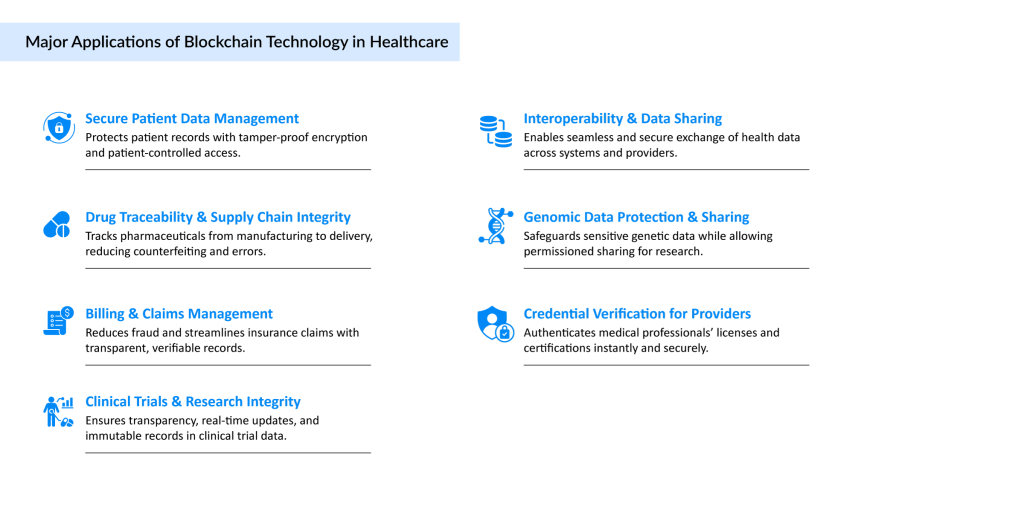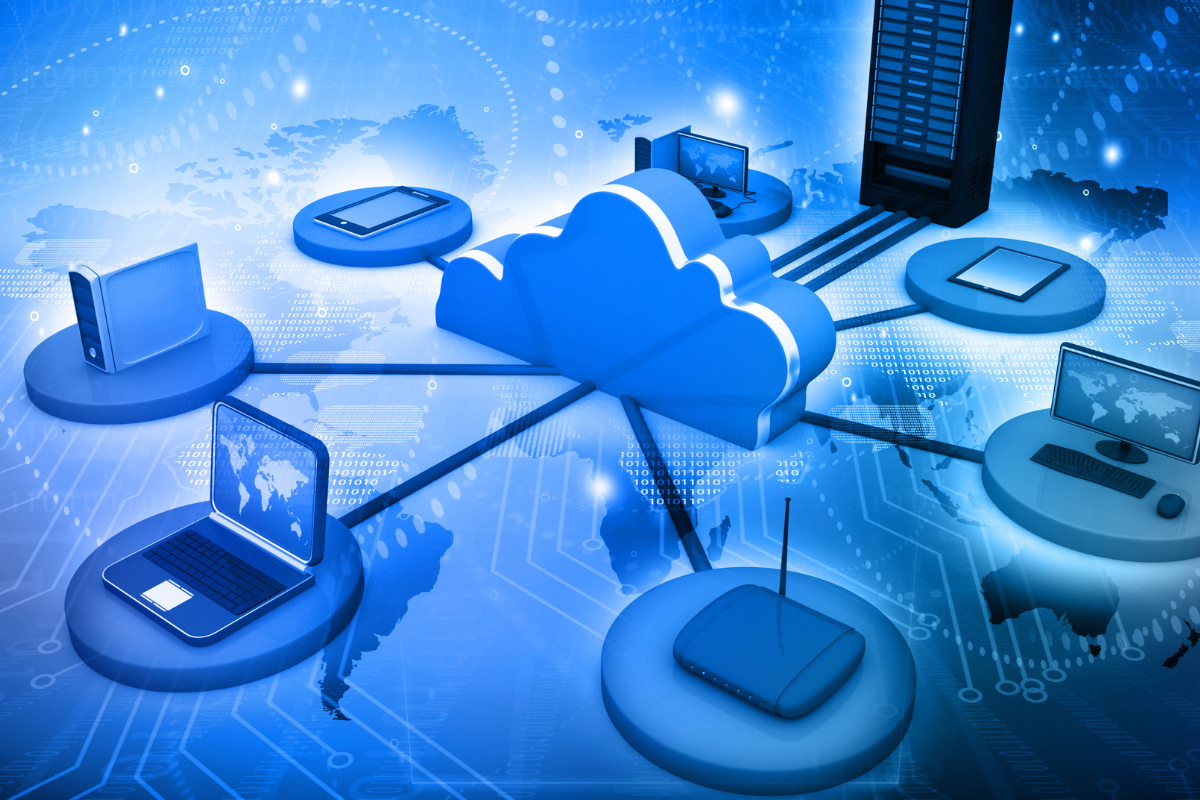The Rise of Blockchain in Healthcare: How It’s Revolutionizing the Industry
Jun 30, 2025
Table of Contents
Blockchain technology in healthcare is rapidly becoming one of the most promising innovations in digital health infrastructure. But what is it exactly? In simple terms, blockchain in healthcare refers to a decentralized digital ledger system that securely records and verifies transactions across a network. By storing linked “blocks” of data that are immutable and time-stamped, blockchain for healthcare data management ensures transparency, traceability, and data integrity, addressing long-standing challenges around trust and interoperability in medical systems.
One major benefit of using blockchain for healthcare data storage is its ability to provide real-time, secure access to medical records across stakeholders while maintaining strict privacy controls. This enables faster clinical decision-making, better coordination among providers, and reduces data fragmentation, key goals in today’s connected care environments.
Downloads
Click Here To Get the Article in PDF
Recent Articles
- Myelodysplastic Syndromes (MDS): Key Pharma Players Unveiling Updated Findings at ASH 2021
- World Health Day
- Cliche can be described as a wonderful strategy.
- Cannabidiol trial; MyoKardia aims; LDL drug data
- Artificial Intelligence in Clinical Trials: Transforming Drug Development Efficiency and Precision
As the blockchain healthcare industry matures, we’re seeing the emergence of practical, scalable solutions. From medical blockchain companies streamlining clinical trial management to healthcare blockchain applications enhancing drug traceability and electronic health records, the impact is growing. Companies such as BurstIQ, Medicalchain, Patientory, Embleema, Iryo, Nebula Genomics, Chronicled, PokitDok (now DokChain), FarmaTrust, Avaneer Health, Guardtime, Akiri, SimplyVital Health, Doc.ai, Robomed Innovations, Clinico, Curisium, iSolve, and others are early pioneers developing robust blockchain healthcare solutions that are now being adopted across multiple healthcare verticals.
Moreover, blockchain applications in healthcare are fueling innovation in cost-effective drug development and personalized treatments. These advances are supported by a new wave of blockchain healthcare startups focused on solving real-world problems through improved transparency and efficiency.
With its potential to ensure secure data sharing, reduce fraud, and drive down administrative costs, blockchain in the medical field is set to become a foundational layer of the modern health system. As healthcare blockchain companies continue to innovate, this technology will redefine how health data is shared, stored, and protected, ushering in a new era of trust-driven healthcare transformation.

With each passing day, blockchain healthcare companies are introducing innovative solutions aimed at reshaping how medical data is shared, accessed, and secured, delivering exceptional value across the healthcare ecosystem. One of the key benefits of blockchain in healthcare is its ability to improve transparency and trust among stakeholders such as patients, physicians, specialists, diagnostic labs, insurance providers, and regulatory bodies. This seamless, tamper-proof data exchange not only strengthens care coordination but also addresses long-standing inefficiencies in healthcare data management.
Operating over the internet on a peer-to-peer (P2P) network, a blockchain system for healthcare maintains a distributed ledger where each node holds an identical, synchronized copy of transactions, removing the need for centralized intermediaries and relying instead on machine consensus for data validation. This decentralized architecture empowers healthcare blockchain applications to enable secure and efficient value exchange in real-time.
Depending on the needs of the healthcare organization or use case, blockchain technologies in healthcare may be deployed as public, private, hybrid, or consortium networks. Each model offers distinct advantages and trade-offs in terms of access control, scalability, and governance, making them suitable for a wide range of blockchain healthcare solutions, from patient identity verification and claims processing to clinical research and supply chain management.

Blockchain in Healthcare – Major Advantages and Issues
In the rapidly evolving field of healthcare, the demand for high-quality, technology-enabled medical services has never been greater. As a result, blockchain in healthcare is emerging as a transformative force, poised to revolutionize how patient data is stored, accessed, and managed. Unlike traditional healthcare database systems, blockchain healthcare solutions offer key advantages such as decentralized management, immutable record-keeping, data provenance, and traceability. These features ensure robust, tamper-proof medical records that are accessible only to authorized users via encryption tied to a patient’s private key, an essential component of blockchain for healthcare data management.
Despite the growing interest in blockchain applications in healthcare, several challenges persist. Concerns such as securing network infrastructure, verifying participants’ identities, and establishing consistent authorization protocols to access electronic health information must be addressed to ensure successful adoption. While healthcare blockchain applications benefit from the transparency of distributed ledger technology (DLT), this same transparency creates privacy concerns, especially when dealing with protected health information (PHI). Public blockchains, in particular, are not ideal for storing sensitive, identifiable health data.
Moreover, although blockchain healthcare management solutions are inherently secure against certain cyber threats, they are not immune to others. Vulnerabilities in the underlying code can expose healthcare blockchains to zero-day attacks and social engineering exploits. Hence, blockchain technology in the healthcare industry must prioritize cybersecurity, especially since its immutability can become a limitation in scenarios involving frequently updated or large datasets. Best practices recommend storing personally identifiable information off-chain while leveraging blockchain’s strengths for auditability, traceability, and verification.
Blockchain Applications in Healthcare
Blockchain applications for healthcare data management are built on the same foundational principles as those used in other industries. At its core, blockchain technology in healthcare functions as a digital ledger, securely storing a shared, immutable record of transactions. These transactions cannot be altered once recorded, ensuring data integrity and transparency.

One of the key advantages of blockchain in healthcare is the elimination of the need for a centralized authority. Participants in a healthcare blockchain network, whether patients, providers, or insurers, do not need a prior relationship to share verified data securely. For instance, with patient consent, an insurer can access medical records stored in a hospital’s EMR system, even without prior interaction with the hospital. This is made possible through blockchain’s decentralized verification process, which authenticates both entities before granting access. Such blockchain healthcare applications are driving interoperability and streamlining communication between siloed systems across the industry.
Major Blockchain Applications in Healthcare
Blockchain in healthcare is redefining medical data management, offering secure, transparent, and efficient solutions to complex challenges. Below, we delve into key blockchain applications in healthcare, showcasing how blockchain technology in healthcare is transforming patient care, research, and operational efficiency while carefully integrating healthcare blockchain solutions to address critical industry needs.
Store Information of an Individual Patient
The application of blockchain in healthcare revolutionizes how patient data is managed across clinical research and care settings. Vast amounts of health information, including blood tests, wellness surveys, and quality assessments, are generated daily. Blockchain for healthcare data management ensures this data, such as patient names, diagnoses, treatments, and medical histories, is securely stored in encrypted Electronic Health Records (EHRs) within a tamper-proof digital ledger.
By leveraging advanced cryptographic techniques, blockchain healthcare applications allow practitioners to verify the authenticity of records against the original data on the blockchain, reducing errors and building trust. Blockchain medical records companies utilize cloud-based blockchain healthcare management solutions to enable seamless, secure access, ensuring patient privacy and compliance with regulations like HIPAA, thus enhancing the blockchain healthcare industry.
Display Information
Blockchain technology in the healthcare industry enhances transparency by providing verifiable information about medication origins, ensuring high-quality, authentic drugs from licensed manufacturers. Unlike traditional systems vulnerable to breaches, blockchain healthcare solutions offer robust security for sensitive data, making them a game-changer for healthcare and blockchain integration.
This use of blockchain in healthcare is transforming industries like pharmaceuticals and clinical trials, where blockchain applications for healthcare data management ensure traceability and quality control. The complexity of blockchain in the healthcare industry drives innovation in vaccines, drugs, and cloud computing, positioning blockchain technology in the healthcare market for significant growth as healthcare blockchain companies adopt these solutions to meet rising demands.
Safety and Transparency
Blockchain in healthcare delivers unparalleled safety and transparency, allowing healthcare providers to prioritize patient care over administrative burdens. By enabling secure data exchange across medical stakeholders, blockchain healthcare applications improve diagnostic accuracy, streamline therapeutics, and create cost-effective ecosystems. A single distributed ledger ensures all parties access verified data, one of the key advantages of blockchain in healthcare. This blockchain solution for healthcare addresses drug traceability and counterfeit issues, ensuring only legitimate medications reach patients. By fostering interoperability, healthcare blockchain strengthens trust and efficiency, supporting the blockchain tech healthcare industry in tackling complex challenges.
Health Record Keeping
Blockchain for healthcare is an ideal solution for medical blockchain record-keeping, enabling secure storage and sharing of EHRs, insurance data, and administrative records. Patients can leverage blockchain healthcare app development to share health information securely via a blockchain healthcare network. This application of blockchain technology in healthcare consolidates fragmented records across multiple facilities, ensuring all data is accessible in one secure location. Blockchain development services for healthcare enhance patient privacy and data authenticity, with healthcare blockchain startups creating platforms that support synchronized, secure access to comprehensive health records, revolutionizing blockchain healthcare management solutions.
Clinical Trials
Blockchain technology in healthcare tackles persistent challenges in clinical trials, such as falsified results and data discrepancies. By ensuring transparency and trust, blockchain healthcare applications enhance the reliability of trial outcomes. Blockchain companies in healthcare use smart contracts to manage participant consent and maintain tamper-proof protocol records, making results accessible for public scrutiny. This blockchain application in healthcare simplifies validation processes, with healthcare blockchain startups developing tools to monitor and validate trial data in real time, strengthening the blockchain healthcare industry and fostering confidence in research integrity.
Identification of False Content
Blockchain in healthcare examples highlight its role in detecting fraudulent content in clinical trials. Blockchain healthcare solutions employ smart contracts to verify participant consent and ensure protocol integrity, making trial results transparent and trustworthy. This use of blockchain in healthcare simplifies validation, allowing public access to reliable data. Healthcare blockchain companies leverage blockchain development services in healthcare to create user-friendly platforms that enhance accountability, ensuring clinical trials align with research objectives, and bolstering trust in the blockchain technology in the healthcare industry.
Patient Monitoring
Blockchain and healthcare integration enhance patient monitoring by ensuring secure access to medical equipment and real-time health data. Blockchain uses in healthcare include IoT-enabled systems for tracking bed utilization, room temperatures, and supply availability, improving logistics transparency. A healthcare blockchain network provides a stable digital identity for providers, enabling responsive patient care. Blockchain tech healthcare industry advancements, combined with IoT, enhance traceability, making blockchain healthcare solutions vital for effective patient monitoring in dynamic healthcare settings.
Minimize Data Transformation Time and Cost
Blockchain in the medical field significantly reduces the time and cost of data transformation by enabling rapid, accurate verification of medical credentials and patient data. Blockchain solutions for healthcare ensure patient anonymity while facilitating secure data sharing across networks. Blockchain development services for healthcare create distributed systems that store time-stamped transaction histories, streamlining processes and fostering innovation. This blockchain healthcare application development approach supports discoveries, enhancing efficiency in the healthcare blockchain ecosystem and driving advancements in care delivery.
Maintain Financial Statements in Hospitals
Accurate financial record-keeping is essential in healthcare, and blockchain in healthcare simplifies accounting and reporting processes. Blockchain healthcare management solutions enable seamless tracking of clinical trial expenses and hospital finances, reducing administrative overhead. Patients can use blockchain healthcare app development to prepare documentation in advance, saving time during visits. This application of blockchain in healthcare addresses operational inefficiencies, with healthcare companies using blockchain to create tools to streamline billing and enhance blockchain technology in the healthcare market.
Safeguarding Genomics
Genetic data security is a growing concern, and blockchain for healthcare offers a robust solution by protecting genomic information and enabling secure data marketplaces for research. Healthcare blockchain companies develop platforms to facilitate safe data sharing, reducing reliance on costly intermediaries. Blockchain technology in healthcare ensures privacy while supporting innovation, with frameworks like Ethereum and Hyperledger Fabric driving healthcare blockchain startups toward scalable, secure solutions. This blockchain application in healthcare fosters research while safeguarding sensitive data, strengthening the blockchain healthcare industry.
Supply Chain Optimization
Blockchain solutions for healthcare are transforming pharmaceutical supply chains by ensuring end-to-end traceability of drugs from manufacturer to patient. Blockchain applications in healthcare prevent counterfeit medications by verifying the authenticity of each batch, a critical issue in the healthcare blockchain landscape. By integrating blockchain technology in the healthcare industry with IoT, healthcare blockchain companies enhance supply chain responsiveness, ensuring the timely delivery of safe medications. This use of blockchain in healthcare improves patient safety and operational efficiency, further solidifying the role of blockchain in the medical field.
Interoperability Across Systems
Blockchain healthcare applications address the challenge of interoperability by enabling seamless data exchange across disparate healthcare systems. Blockchain for healthcare data management creates a unified platform where hospitals, clinics, and insurers can access verified patient data in real time. This advantage of blockchain in healthcare reduces duplication, enhances care coordination, and improves patient outcomes. Blockchain development services in healthcare are pivotal in building these interoperable networks, ensuring that the blockchain technology in the healthcare market meets the evolving needs of a connected healthcare ecosystem.
Way Ahead
Blockchain technology is steadily making its way into the healthcare sector, but several unique challenges must be addressed. One of the primary barriers to blockchain healthcare adoption is the lack of awareness and understanding within medical institutions. Currently, blockchain applications in healthcare are still in their infancy, requiring significant advancements in blockchain development services for healthcare to fully unlock their potential. Nevertheless, the technology aligns well with the objectives of medical associations and regulatory authorities, making it a promising solution for transforming the healthcare system.
As blockchain in the healthcare industry continues to evolve, its role in improving transparency, traceability, and interoperability is becoming increasingly evident. By enabling secure healthcare blockchain solutions for confirming and validating transactions, the technology supports encrypted data sharing through public and private keys. This not only ensures patient-level numerical security but also enhances the management of electronic health records, medicines, prescriptions, and supply chains.
Furthermore, the growing involvement of healthcare blockchain companies and tech giants in this space is accelerating innovation. From improving treatment workflows to ensuring data integrity, the application of blockchain technology in healthcare is set to reshape the future of patient care. As these solutions mature, the advantages of blockchain in healthcare, such as real-time data exchange, fraud prevention, and enhanced interoperability, are expected to drive significant growth in the sector.
Downloads
Article in PDF
Recent Articles
- Major Highlights of ASH 2021 Annual Meeting: Stay abreast of the fresh developments!!
- Hemophilia A- Market Scenario
- Artificial Intelligence in Clinical Trials: Transforming Drug Development Efficiency and Precision
- Ways IoT Has Transformed The Pulse Of Healthcare, And Will Continue To Do So In The Future
- Notizia



